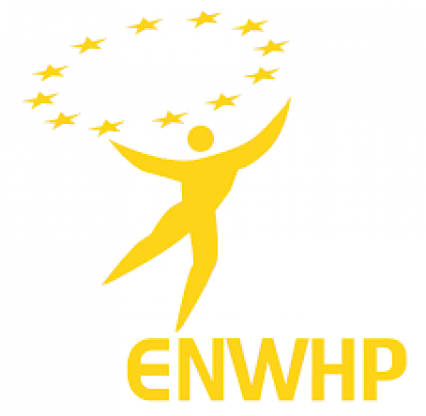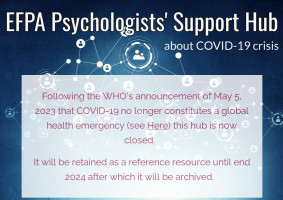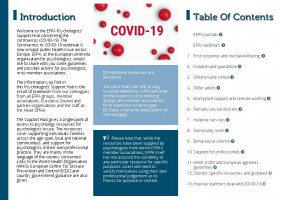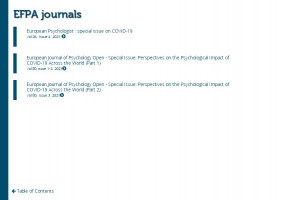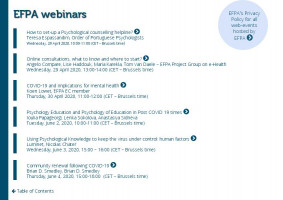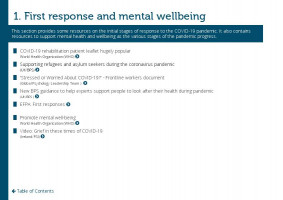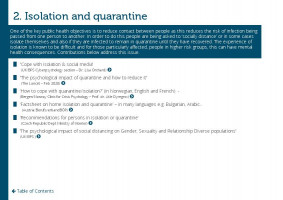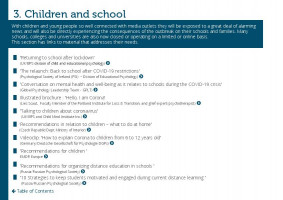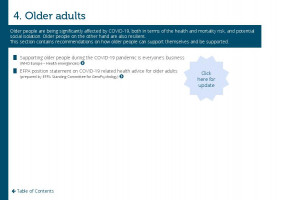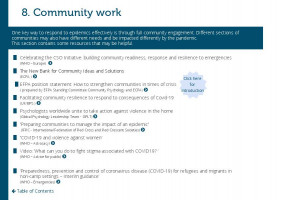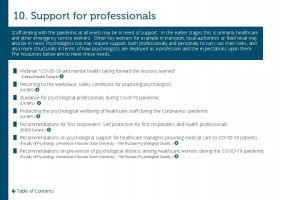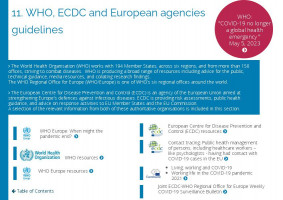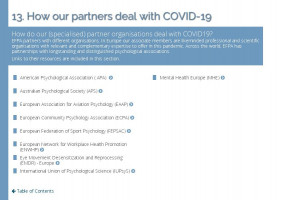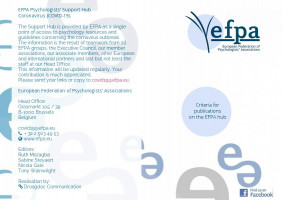How do our (specialised) partner organisations deal with COVID19?
EFPA partners with different organisations. In Europe our associate members are likeminded professional and scientific organisations with relevant and complementary expertise to offer in this pandemic. Across the world, EFPA has partnerships with longstanding and distinguished psychological associations.
Links to their resources are included in this section.

United States of Amercia
American Psychological Association ( APA) :
COVID-19 resources from APA
Browse free collection of psychological research on COVID-19 published across the APA Journals portfolio.
Stressed or Worried About COVID-19?
Step-by-Step Stress Management Technique to Help During the Pandemic
The Global Psychology Leadership Team has produced for frontline workers this document on stress management technique during the pandemic.
Download here as .PDF the APA version of the document
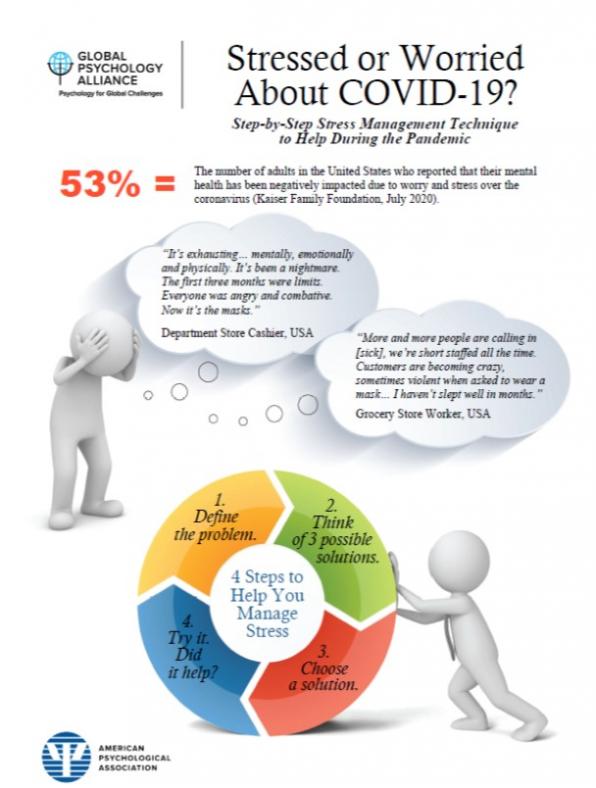
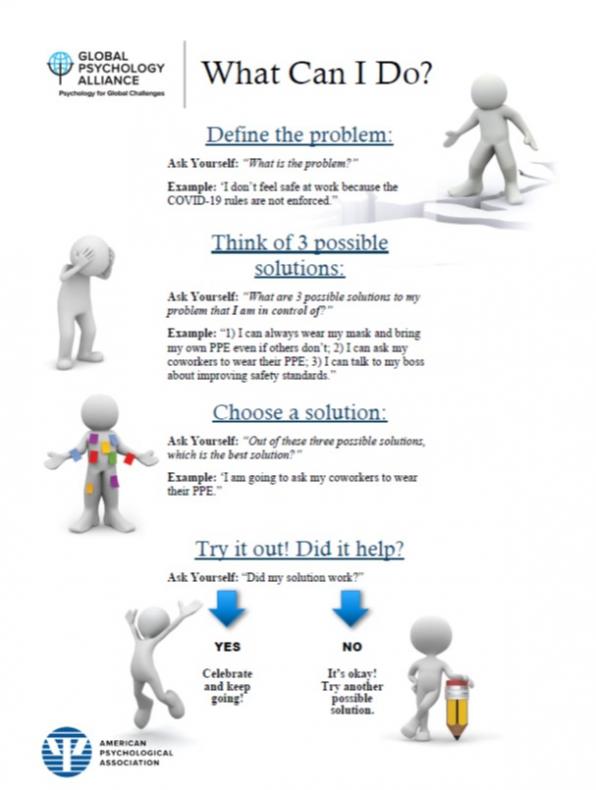
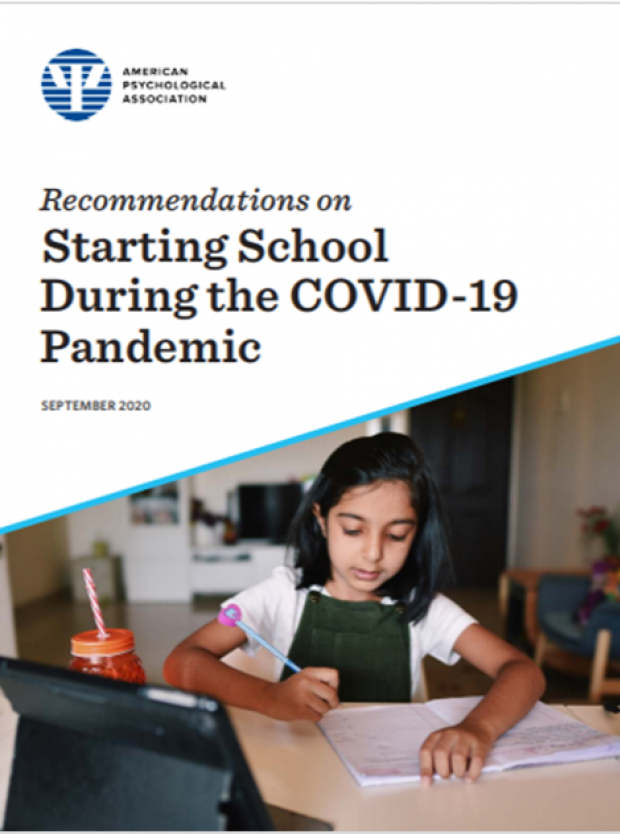
The aim of this report
This report is intended to complement a number of outstanding existing reports compiled by respected government, university, and association sources on how children can return safely to school during the coronavirus pandemic. Eight psychologists who specialize in studying and working with children and youth from pre-K to 12th grade reviewed those reports and contributed to this document with the following goals in mind:
- To identify areas essential to effective schooling, including virtual learning, that are not emphasized in the other reports.
- To provide practical, evidence-based steps shown by psychological research to enhance student learning and well-being, whether in person or online.
- To offer suggestions to parents, and administrators of school-age children on how to implement these steps. The examples target the general student population and can be modified to address age differences as needed.
Global Psychology Leadership Team has also provided an editable word template to be translated and adapted to your associations and contexts.
Document and recommandation about its use can be found under 1. First response and mental wellbeing
American Psychological Association ( APA) :
Recorded webinars and podcasts addressing topics ranging from financial anxiety, to stress and uncertainty, to resilience, to grieving , as well as resources for students of psychology to name a few.
Find all webinars and podcasts here on Youtube
Australian Psychological Society (APS)
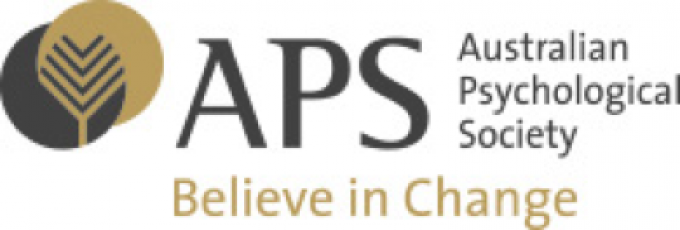
Australia
Our colleagues in the Australian Psychological Society have kindly shared these resources with us so that we can share them across Europe, in international solidarity.
Helping children transition back to school in the COVID-19 era- Advice for parents and carers
They could provide a model (to be tailored to local circumstances) of how psychologists’ associations can support psychologists so they can in turn support the communities we are here to serve.
Preparing your practice to deal with the COVID-19 (for practitioners), pdf
Tips for coping with coronvirus anxiety, pdf
Coronavirus message from APS CEO Frances Mirabelli (vimeo)
European Association for Aviation Psychology (EAAP)
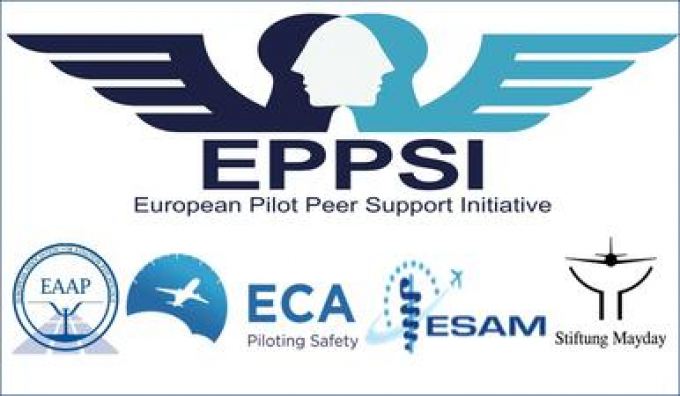
European Association or Aviation Psychology EAAP
The COVID-19 crisis and its effect on aviation mental health
Joint position paper
Airlines, aviation organisations and their employees were not prepared for a pandemic, like COVID-19. Most European and international airlines have stopped flying or are focussing on cargo flights, medical and rescue operations or return flights. Most countries have issued strict quarantine and physical distancing measures .
Read more about Psychological sressors and Psychological strains & resilience in the European PIlot Peer Support Initiative (EPPSI) join statement.
European Community Psychology Association (ECPA)
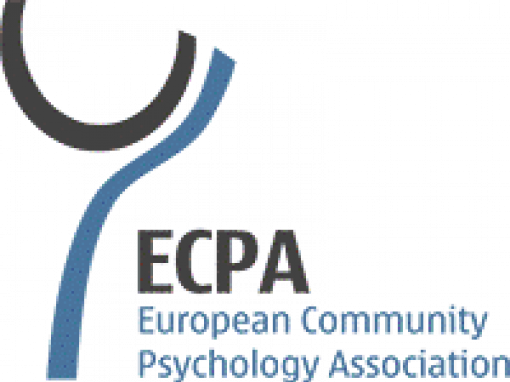
ECPA is pleased to introduce the New Bank for Community Ideas and Solutions, a unique global collaboration designed to promote community building and strengthen community life everywhere. The Bank is a collection of ideas and solutions inspired by the spontaneous community creativity emerging from the pandemic and other crises our planet is experiencing (e.g., climate change, racism, social injustice).
Perhaps your own community has experienced a surprising situation or developed a distinctive response to the coronavirus outbreak. We encourage you to share your experience by clicking the button just below, and answering a few brief questions.
You can share your community story in English, Spanish, German, Italian or Portuguese.
If your experience or story fits this description, we will aim to post it on multiple sites (e.g., ECPA, SCRA, CTB, etc). We will also share the stories in a Facebook Group and later at the new web portal of the New Bank of Community Ideas and Solutions.
We hope this site may help to demonstrate the importance of community building in a time of crisis, and illustrate the many ways that community psychology and community action can make a contribution.
Remembering our shared moments and experiences will help to create a better world!
European Federation of Sport Psychology (FEPSAC)
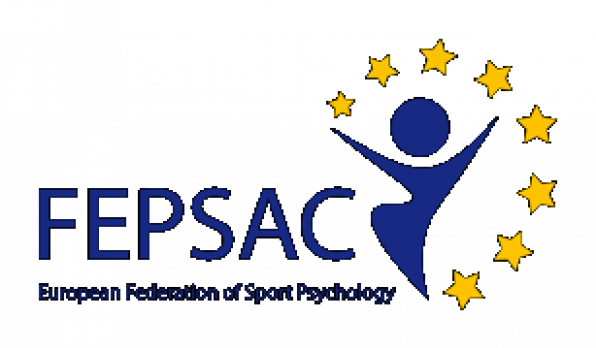
European Federation of Sport Psychology (FEPSAC)
Advice from TeamNL – Dutch Olympic Committee – sport psychologist
As the coronavirus continues to affect everyone’s daily routine, it’s now more important than ever that you stay positive and #mentallyfit. You can do this by taking care of both your mental and physical health.
At Team NL, a number of recommendations have been developed which can make the situation more manageable for athletes. In these unprecedented times, it's more important than ever that you #StayPositive and mentally fit.
Here, TeamNL’s team psychologist Paul Wylleman shares 6 key recommendations to help keep you on the right path during these challenging times.
Download recommendations as PDF in Englilsh in Dutch
European Network for Workplace Health Promotion (ENWHP)
Eye Movement Desensitization and Reprocessing (EMDR) - Europe
(1)_w680_h158_1.png)
Eye Movement Desensitization and Reprocessing (EMDR) - Europe
Coronavirus: how to deal with it
Suggestions for Managing Fear in Children and Adults
Download here EMDR flyer "How to deal with fear" as PDF
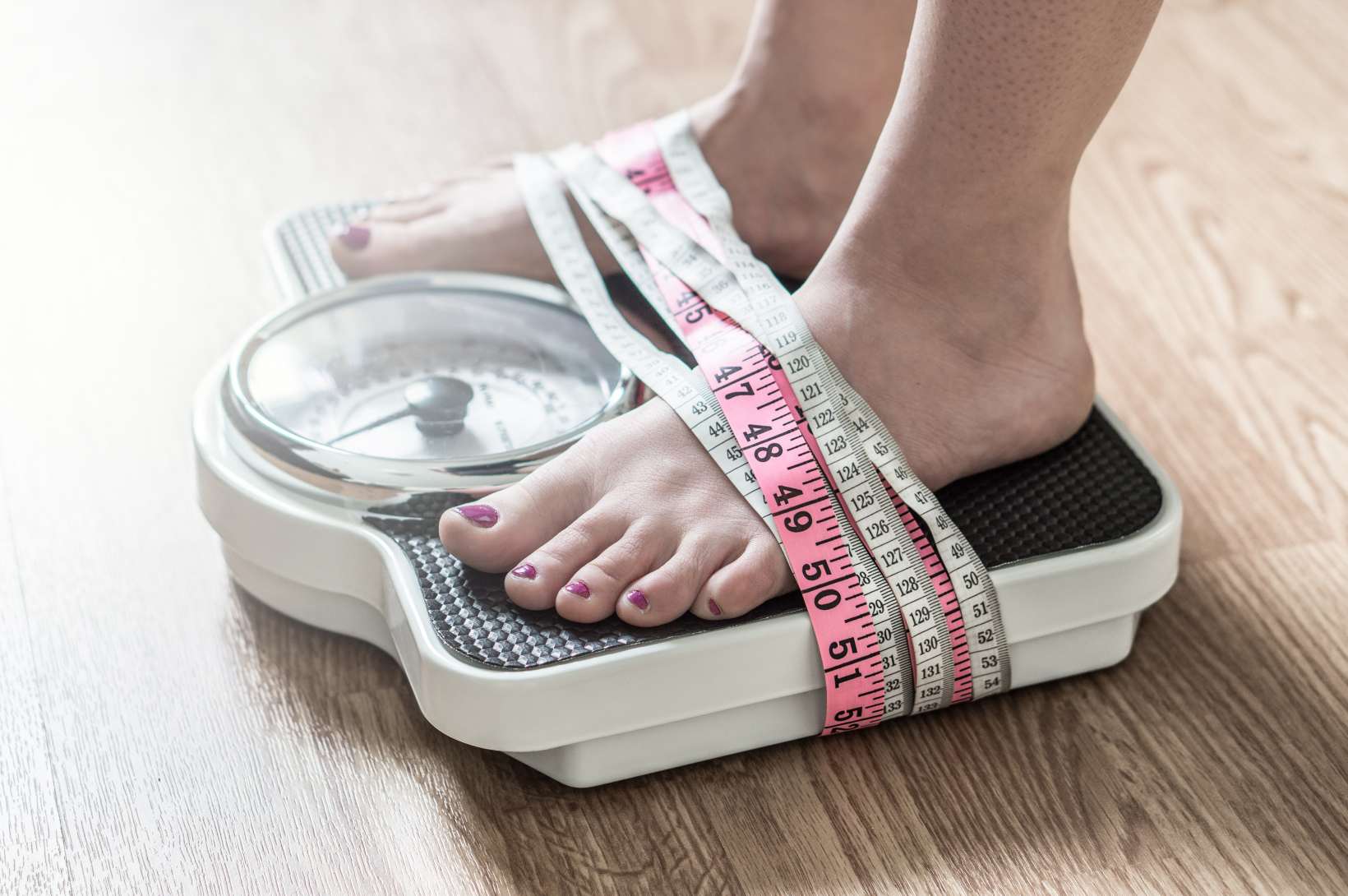
The Covid-19 pandemic declared by the World Health Organization (WHO) on March 11, 2020 has changed the living conditions of the world's population; with more than 15 million infections and over 600,000 deaths, the outbreak of the novel Coronavirus has forced several countries to resort to a temporary lockdown to stop its spread. Physical distancing, compulsory use of masks, long queuing at supermarkets, and the forced isolation at home resulted in a general increase in stress, anxiety and fear related to the possibility of being infected and die from Covid-19 (Wang et al., 2020).
While the state of emergency and uncertainty associated with Covid-19 has led to an increase in anxious and depressive symptoms in the majority of the population, this has had even more severe consequences on individuals with a pre-existing mental disorder (Chaturvedi, 2020). In particular, eating disorders are among the diseases most influenced by the lockdown state.
Table of Contents
International Union of Psychological Science (IUPsyS)
.jpg)
International Union of Psychological Science (IUPsyS)
IUPsyS coronavirus pandemic response survey - European level summary
Colleagues will recall that IUPsyS National Members, Affiliates and other organisations were contacted by email, inviting them to participate in a survey on psychology associations’ responses to the coronavirus pandemic. The responses have now been analysed by IUPsyS and associations that participated have received individual reports. Our friends in IUPsyS have kindly prepared a summary of the outputs for us at the European level, and we attach that here.
Survey responses were received by IUPsyS from 79 organisations in 72 countries. 20 of EFPA’s 38 member countries responded, representing some 220,000 European psychologists. Albania, Belgium, Cyprus, Czech Republic, Denmark, France, Germany, Greece, Iceland, Ireland, Italy, Latvia, Luxembourg, Netherlands, Norway, Portugal, Romania, Slovenia, Ukraine, and United Kingdom submitted data from the European region.
We are circulating this as colleagues may be interested to compare the results within Europe and also see the comparison with the international aggregate results. The analysis we have received does not show whether differences are significant and differences in perspective between countries and continents when rating are inevitable. Some of the results may also indicate differences in health and social care systems and local / national government structures, which would influence the role psychologists and psychology professional bodies played at the start of the pandemic in supporting their communities.
Download here the European level summary as PDF
Mental Health Europe (MHE)
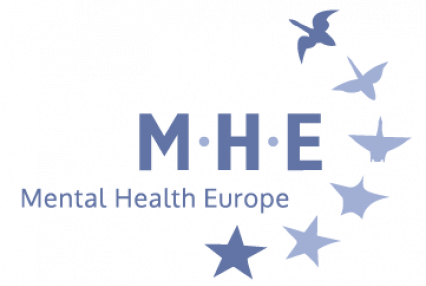
Helplines and services to support your mental health during COVID-19
2021 edition
Mental Health Europe (MHE) created a map of helplines and services to support your mental health during the COVID-19 crisis and beyond. Information from 34 European countries was gathered with the valuable support of MHE members and the European Federation of Psychology Students’ Associations (EFPSA).
In a few clicks, this interactive map will help you find more details on helplines and services providing mental health care during COVID-19 in your country, including COVID-specific support.


